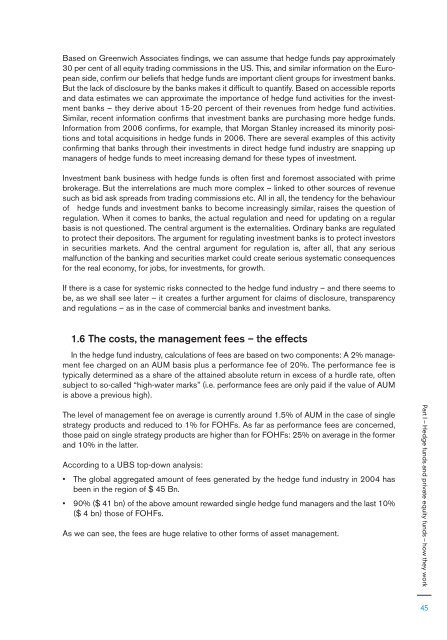Hedge funds and Private Equity - PES
Hedge funds and Private Equity - PES
Hedge funds and Private Equity - PES
Create successful ePaper yourself
Turn your PDF publications into a flip-book with our unique Google optimized e-Paper software.
Based on Greenwich Associates findings, we can assume that hedge <strong>funds</strong> pay approximately<br />
30 per cent of all equity trading commissions in the US. This, <strong>and</strong> similar information on the European<br />
side, confirm our beliefs that hedge <strong>funds</strong> are important client groups for investment banks.<br />
But the lack of disclosure by the banks makes it difficult to quantify. Based on accessible reports<br />
<strong>and</strong> data estimates we can approximate the importance of hedge fund activities for the investment<br />
banks – they derive about 15-20 percent of their revenues from hedge fund activities.<br />
Similar, recent information confirms that investment banks are purchasing more hedge <strong>funds</strong>.<br />
Information from 2006 confirms, for example, that Morgan Stanley increased its minority positions<br />
<strong>and</strong> total acquisitions in hedge <strong>funds</strong> in 2006. There are several examples of this activity<br />
confirming that banks through their investments in direct hedge fund industry are snapping up<br />
managers of hedge <strong>funds</strong> to meet increasing dem<strong>and</strong> for these types of investment.<br />
Investment bank business with hedge <strong>funds</strong> is often first <strong>and</strong> foremost associated with prime<br />
brokerage. But the interrelations are much more complex – linked to other sources of revenue<br />
such as bid ask spreads from trading commissions etc. All in all, the tendency for the behaviour<br />
of hedge <strong>funds</strong> <strong>and</strong> investment banks to become increasingly similar, raises the question of<br />
regulation. When it comes to banks, the actual regulation <strong>and</strong> need for updating on a regular<br />
basis is not questioned. The central argument is the externalities. Ordinary banks are regulated<br />
to protect their depositors. The argument for regulating investment banks is to protect investors<br />
in securities markets. And the central argument for regulation is, after all, that any serious<br />
malfunction of the banking <strong>and</strong> securities market could create serious systematic consequences<br />
for the real economy, for jobs, for investments, for growth.<br />
If there is a case for systemic risks connected to the hedge fund industry – <strong>and</strong> there seems to<br />
be, as we shall see later – it creates a further argument for claims of disclosure, transparency<br />
<strong>and</strong> regulations – as in the case of commercial banks <strong>and</strong> investment banks.<br />
1.6 The costs, the management fees – the effects<br />
In the hedge fund industry, calculations of fees are based on two components: A 2% management<br />
fee charged on an AUM basis plus a performance fee of 20%. The performance fee is<br />
typically determined as a share of the attained absolute return in excess of a hurdle rate, often<br />
subject to so-called “high-water marks” (i.e. performance fees are only paid if the value of AUM<br />
is above a previous high).<br />
The level of management fee on average is currently around 1.5% of AUM in the case of single<br />
strategy products <strong>and</strong> reduced to 1% for FOHFs. As far as performance fees are concerned,<br />
those paid on single strategy products are higher than for FOHFs: 25% on average in the former<br />
<strong>and</strong> 10% in the latter.<br />
According to a UBS top-down analysis:<br />
The global aggregated amount of fees generated by the hedge fund industry in 2004 has<br />
been in the region of $ 45 Bn.<br />
90% ($ 41 bn) of the above amount rewarded single hedge fund managers <strong>and</strong> the last 10%<br />
($ 4 bn) those of FOHFs.<br />
As we can see, the fees are huge relative to other forms of asset management.<br />
Part I – <strong>Hedge</strong> <strong>funds</strong> <strong>and</strong> private equity <strong>funds</strong> – how they work<br />
45




